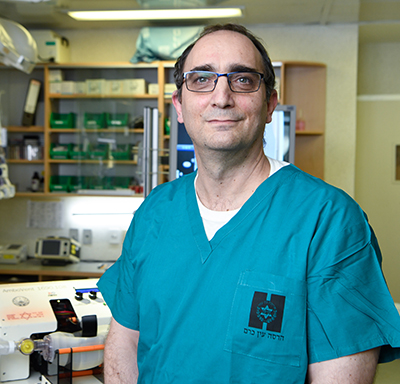Health + Medicine
Feature
Confronting the Covid Pandemic, In Israel and Abroad

Hadassah surgeon Dr. Yoav Mintz was relieved to get a call in March from a familiar phone number from Milan. More than 100 Italian doctors had died battling Covid-19. Dr. Mintz was happy to hear that his colleague, Dr. Antonello Forgione, was O.K. and to help him try to find easy-to-produce ventilators. But while the Italians were interested in ventilators being designed by Israeli military engineers, the machines weren’t yet ready. The military “engineers can’t do it alone,” Dr. Forgione advised. “They need Hadassah right now.”
Dr. Mintz, an endoscopic surgeon and inventor of numerous medical devices, heeded the call. The engineers were indeed missing the essential step of clinical trials on animals before the device could be tried on patients. They also had overlooked the need for an air pressure monitor to guard delicate lung tissue. Dr. Mintz found a kibbutz ready to donate a pig and delivered it to the large animal house at Hadassah Hospital in Ein Kerem, where animal trials take place. “The pig did great, even better than was expected,” said Dr. Mintz. The process took a giant step forward.
The story illustrates the important role that Hadassah’s medical staff has been playing in confronting the worldwide pandemic. Decades of combining medical experience with research and a knack for innovation has made Hadassah Medical Organization both successful in treating Covid-19 patients and a leader in contributing to the global effort.
As the number of patients skyrocketed in other countries, Hadassah’s administration prepared to be inundated. “Thankfully, this dire scenario never came about,” said Dr. Yoram Weiss, director of Hadassah Hospital at Ein Kerem and a specialist in intensive care. “Nonetheless, at Hadassah, with our long history of dealing with war and terror, we know the necessity of being prepared.”
As of early June, over 1,400 sick persons had arrived at the hospital with suspicion of Covid-19, and several hundred with the virus were hospitalized. Though data is still being collected, Hadassah’s coronavirus ICU, which treated the sickest patients, has had an extremely high survival rate of 80 percent. And no Hadassah medical staffers have been infected with the disease at the hospital because of robust safety protocols.
“There is a lot of interest in the successful safety protocols developed at Hadassah,” said Dr. Mintz, who was among the lead presenters at a multination online conference in May about returning to the operating room as the pandemic eases.
At the beginning of the crisis, the government’s central laboratory closed because staff members were infected. Hadassah soon took over the leadership in testing.
“Almost overnight, we went from a mid-sized laboratory with 150,000 tests a year to expanded facilities that could do 3,000 tests a day,” said Dr. Dana Wolf, who heads the Clinical Virology Unit and the Virology and Infectious Diseases laboratory. Simultaneously, the laboratory team began working with the Ministry of Health to create a serum of antibodies to fight the disease.
Sixteen coronavirus clinical trials have been launched at HMO, according to Dr. Eyal Mishani, head of Hadassah Research and Development. Several focused on repurposing existing drugs, and Hadassah is among the first centers outside of Japan to test the Japanese drug Avigan, which could prevent the virus from replicating. Other trials seek to identify biomarkers to understand why certain exposed persons get Covid-19 while others do not. A recent breakthrough identified the mechanism that causes blood clots in Covid-19 patients and how to treat them.
“Like others, we are working on finding the right cocktail of anti-viral drugs that will stop the cytokine storm, the attack of the immune system on the lungs and its deleterious consequences in other parts of the body,” said Dr. Mishani.
One important clinical trial is aimed at a medicine that inhibits the enzyme that escorts the lethal virus across cell membranes. In initial trials, this Hadassah-developed method reduced the viral load, and it lightened and shortened the disease in infected patients.
And the ventilator? With funding from the United States Agency for International Development (US AID), a prototype was developed, using easily obtainable motors like those that power windshield wipers or lower car windows. An open-source template for the ventilator, on the Hadassah site, has been downloaded over 40,000 times, and is currently being used by teams from 8 different countries.
Barbara Sofer is a veteran journalist and author as well as Israel director of public relations for Hadassah. She lives in Jerusalem.








 Facebook
Facebook Instagram
Instagram Twitter
Twitter
Leave a Reply